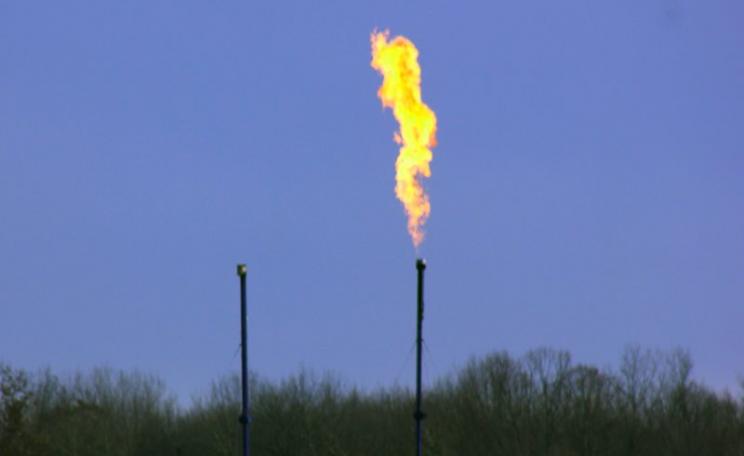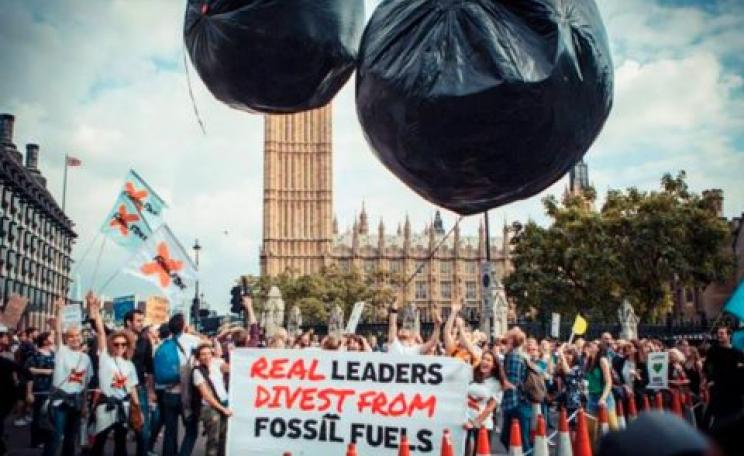Now is the time to divest and invest to let our world leaders know that we, as individuals and institutions, are taking action to address climate change, and we expect them to do their part this December in Paris at the UN climate talks.
The movement to divest from fossil fuels and invest in renewable energy and climate solutions has exploded, now topping $2.6 trillion, according to a new analysis released today.
"To date, 436 institutions and 2,040 individuals across 43 countries and representing $2.6 trillion in assets have committed to divest from fossil fuel companies", states the report from Arabella Advisors.
"The divestment movement has grown exponentially since Climate Week in September 2014."
At that time 181 institutions and 656 individuals representing over $50 billion in assets had committed to divest, and divestment advocates pledged to triple these numbers by the December 2015 Paris UN climate negotiations.
But those hopes have been vastly exceeded: "Three months before the negotiations, we have already witnessed a fifty-fold increase in the total combined assets of those committed to divest from fossil fuels."
The increasing commitments to invest and a proliferation of fossil free products also mean that more capital is flowing toward climate solutions, says the report:
"Globally, investment in clean energy reached $310 billion in 2014. Among those pledging to divest, many are also committing to invest in climate solutions: those institutions and individuals that have pledged to both divest and invest in clean energy collectively hold $785 billion in assets."
Leonardo: 'Now is the time to divest and invest'
Commitments have come from governments and investors from 43 countries and multiple sectors, including pension funds, health, education, philanthropy, faith, entertainment, climate justice and municipalities.
Recent notable commitments include the $476 billion California Public Employees' Retirement System, the Norway Pension Fund, the Canadian Medical Association, the World Council of Churches, the University of California system, actor and environmentalist Leonardo DiCaprio, and the Leonardo DiCaprio Foundation.
"Climate change is severely impacting the health of our planet and all of its inhabitants, and we must transition to a clean energy economy that does not rely on fossil fuels, the main driver of this global problem", said DiCaprio, who announced his commitment today.
"After looking into the growing movement to divest from fossil fuels and invest in climate solutions, I was convinced to make the pledge on behalf of myself and the Leonardo DiCaprio Foundation.
"Now is the time to divest and invest to let our world leaders know that we, as individuals and institutions, are taking action to address climate change, and we expect them to do their part this December in Paris at the UN climate talks."
Providence, Rhode Island became one of the largest cities to commit to divesting all its funds from top coal companies. In Australia, the city of Newcastle - home to the largest coal port in the world - voted to divest, as did the government of the Australian Capital Territory.
Now is the time to divest and invest to let our world leaders know that we, as individuals and institutions, are taking action to address climate change, and we expect them to do their part this December in Paris at the UN climate talks.
"If these numbers tell us anything, it's that the divestment movement is catching fire", said May Boeve, Executive Director of 350.org.
"Since starting on the campuses of a few colleges in the US, this movement has struck a chord with people across the world who care about climate change, and convinced some of the largest and most influential institutions in the world to begin pulling their money out of climate destruction.
"That makes me hopeful for our future, and it's sending a clear message to world leaders as they head into Paris: It's time for them to follow suit, and divest our governments from fossil fuel companies too."
Fossil fuel assets come with real and quantifiable risks
Recent financial analyses from HSBC, Citigroup, Mercer, Bank of England and the International Energy Agency all indicate a significant, quantifiable risk to portfolios exposed to fossil fuel assets.
"The Arabella Report shows that more and more investors are reducing their carbon risk today and diversifying their portfolios with the goal to harness the upside in the sustainable clean growth industries of the future", said Thomas Van Dyck, Managing Director-Financial Advisor of SRI Wealth Management Group.
"That underscores what I see every day as a financial advisor-that the demand for fossil-free investment products is increasing."
When Norway's $900 billion sovereign wealth fund decided to divest from 122 coal companies - the largest divestment commitment to date - a joint statement by Norway's political parties cited both climate and financial risks, the report points out.
Similarly, when the French insurance company Axa announced it would divest $576 million in coal assets by the end of 2015, its CEO argued that "it is our responsibility, as a long-term institutional investor, to consider carbon as a risk and to accompany the global energy transition."
"Investing at scale in clean, efficient power offers one of the clearest, no regret choices ever presented to human progress", said Christiana Figueres, executive secretary of the UNFCCC, in a video statement at a press conference in New York today unveiling the Arabella Advisors report.
The United Nations climate chief has been advocating for the shift of investment flows from fossil fuels to climate solutions to meet the $1 trillion / year need for clean energy investment - and to create momentum ahead of the upcoming international climate negotiations in Paris this December.
Divestment strategies vary among participants in the movement. Some have divested from all fossil fuel companies both large and small; others are beginning with coal and / or tar sands. The Arabella Advisors report provides details on commitments made to date.
The report: 'Measuring the Growth of the Global Fossil Fuel Divestment and Clean Energy Investment Movement' is by Arabella Advisors.
More information: Divest-Invest







